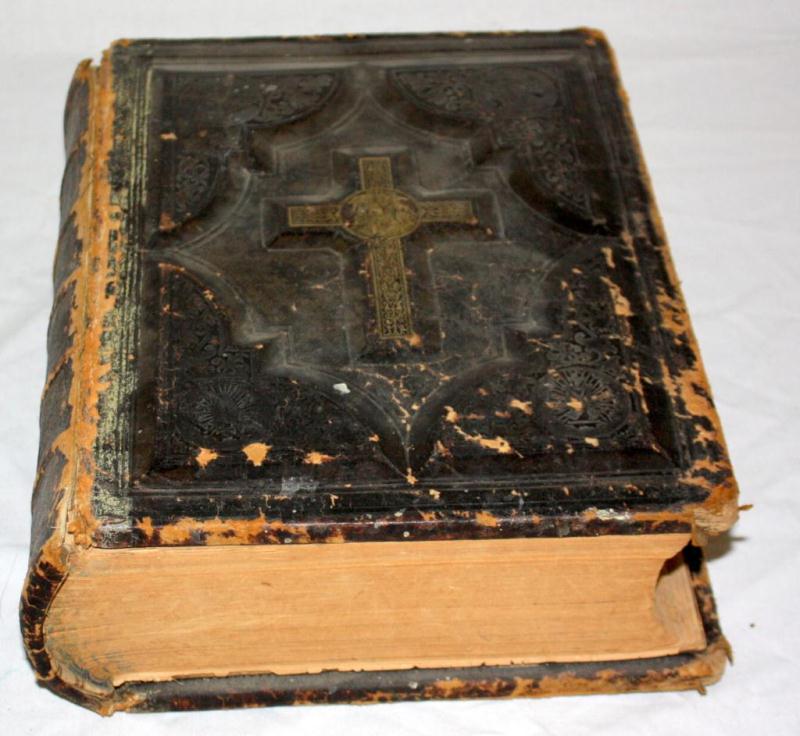The Book of books

![]()

![]()
Oh, how skeptics and unbelievers have raged against the Bible! As Jesus said, "Light has come into the world, but men loved darkness instead of light because their deeds were evil" (John 3:19). Since men cannot harm God, they instead focus their diabolical attacks on His Word. "It isn't trustworthy, it's been mis-translated, it's based upon myths", etc., etc. Almost always those who criticize in such a way have never bothered to investigate to see whether their claims are true. But the Bible has tremendous evidence to support its claim as the Word of God and divine inspiration. Most people have little knowledge of how the Bible came into being or who wrote the individual books. We will see how it came into being below.
![]()

The words of the Bible encompass a period of 1,600 years and authored by 66 individuals. Three languages were used - Hebrew, Aramaic and Greek. 2,930 individuals play a part in Scripture in 1,551 locations. The Bible contains over half a million words and employs such literary styles as poetry, history, romance, mystery, science and biography.
Genesis
The
first book of the Holy Bible was probably written by many first-hand eyewitnesses
to the events depicted within. (Much of the material is written in the
present tense - not the past tense). The events in the garden of Eden and
shortly afterward were probably written by Adam himself. Subsequent events
and records were then handed down and recorded by his line. Noah would
record all the events of the Flood, then his descendents maintained the
records from the sons of Noah through Abraham, Isaac, Jacob, Joseph, etc.,
until the ancient accounts made their way to Moses, who compiled them into
one volume.
| MOSES
Author of Exodus through Deuteronomy, and compiler of Genesis. Living about 1,450 years before Christ, he also penned Psalm 90 and possibly the book of Job. |
![]()
JOSHUA
Joshua wrote the book bearing his name, and it also says the last five verses of the book were written by two others - Eleazar, Moses' nephew, who appended Joshua's death notice (Josh. 24:29-32) and Phinehas, who added the notice about his father's death (Josh. 24:33).
![]()
Samuel
The prophet Samuel may have compiled and edited historical accounts of his predecessors in the book of Judges, since it spans 330 years of history (from @1380-1050 B.C.) Talmudic texts also suggest that he may have written the book of Ruth.
![]()
Ruth
According to the Talmud, Ruth was probably written by Samuel. It was also originally an appendix to the book of Judges.
|
|
Nathan and Gad compiled the histories of David and Solomon, beginning with Samuel's death (I Sam. 25:1). I Chron. 29 and II Chron. 9 record that Nathan and Gad gave us the histories of David and Solomon.
Between 1050 and 970 B.C., David wrote 75 Psalms - 2-9; 11-32; 34-41; 51-65; 68-70; 86; 95; 101; 103; 108-110; 122; 124; 131; 133; 138-145. (Acts 4 attributes chapters 2 and 95 to him).
![]()
Asaph to Henman
Asaph
composed 12 Psalms - 50, 73-83. Ten Psalms are attributed to sons of Korah
of Levi, which may have included Assir, Elkanah, Ebiasaph, Tahath, Uriel,
Uzziah, and Shaul. Heman, a grandson of Samuel, wrote Psalms 88, and Ethan
authored Psalms 89.
The authors of Psalms span @500 years, from Moses (Psalms 90 - 1450 B.C.)
to the Jews' Babylonian Exile (Psalms 137 - 500 B.C.)
![]()
Solomon
Between 970 and 930 B.C. Solomon wrote the Song of Solomon, Proverbs 1-29, Ecclesiastes, and Psalms 72 and 127 - 51 chapters.
![]()
|
Agur wrote Proverbs 30 and Lemuel chapter 31. Lemuel was king of Massa, while little is known of Agur, other than that his name means "gathered". |
Kings and Chronicles - which originally were just one book each - have many authors. Included are Ahijah, Iddo, Shamalah, and Jehu.
![]()
Jeremiah
This prophet wrote the book bearing his name, as well as Lamentations.
The Rest Of The Old Testament
The last 17 Old Testament prophetic books were all written after Solomon's
son Rehoboam split the Kingdom in 930 B.C. All are named for their human
authors (except for Lamentations).
|
|
Matthew
This apostle wrote his gospel between 55 and 65 A.D. He was attacked and clubbed to death in Nadabah.
![]()
Mark
He wrote the book bearing his nameprobably in the late 40's A.D. Mark gave an account of the life of Christ as he heard it from the apostle Peter. Mark died a martyr's death as he was dragged to pieces by the people of Alexandria.
Luke the physician penned both the Gospel of Luke and the book of Acts. He was also a faithful companion of Paul to the very end. Luke was supposed to have been hanged on an olive tree by the idolatrous priests of Greece.
John
"The disciple whom Jesus loved" wrote the gospel of John, I, II, and III John, and the book of Revelation. Tradition has it that the emperor Domitian sentenced him to death by being boiled in oil, yet he miraculously emerged unharmed. He was then banished to Patmos, where he wrote the book of Revelation. After Domitian died John was set free, and he settled in Ephesus. He is the only apostle who escaped a violent death.
Paul
Author of two-thirds of the New Testament, the apostle to the Gentiles wrote 87 chapters, including Romans, I and II Corinthinans, Galatians, Ephesians, Philippians, Colossians, I and II Thessalonians, I and II Timothy, Titus, and Philemon. (It is thought that he - or perhaps Apollos - may have written Hebrews also, but this is merely speculation). Paul was beheaded during Nero's reign.
James
James, the brother of Jesus (not the brother of John), was the leader of the church in Jerusalem and wrote the book bearing his name. At the age of 94 he was beaten and stoned by the Jews, and finally had his brains dashed out with a fuller's club.
Jude, the brother of James, wrote this one chapter New Testament book. He was crucified at Edessa, A.D. 72.
![]()
 |
Manuscript Transmission |  |